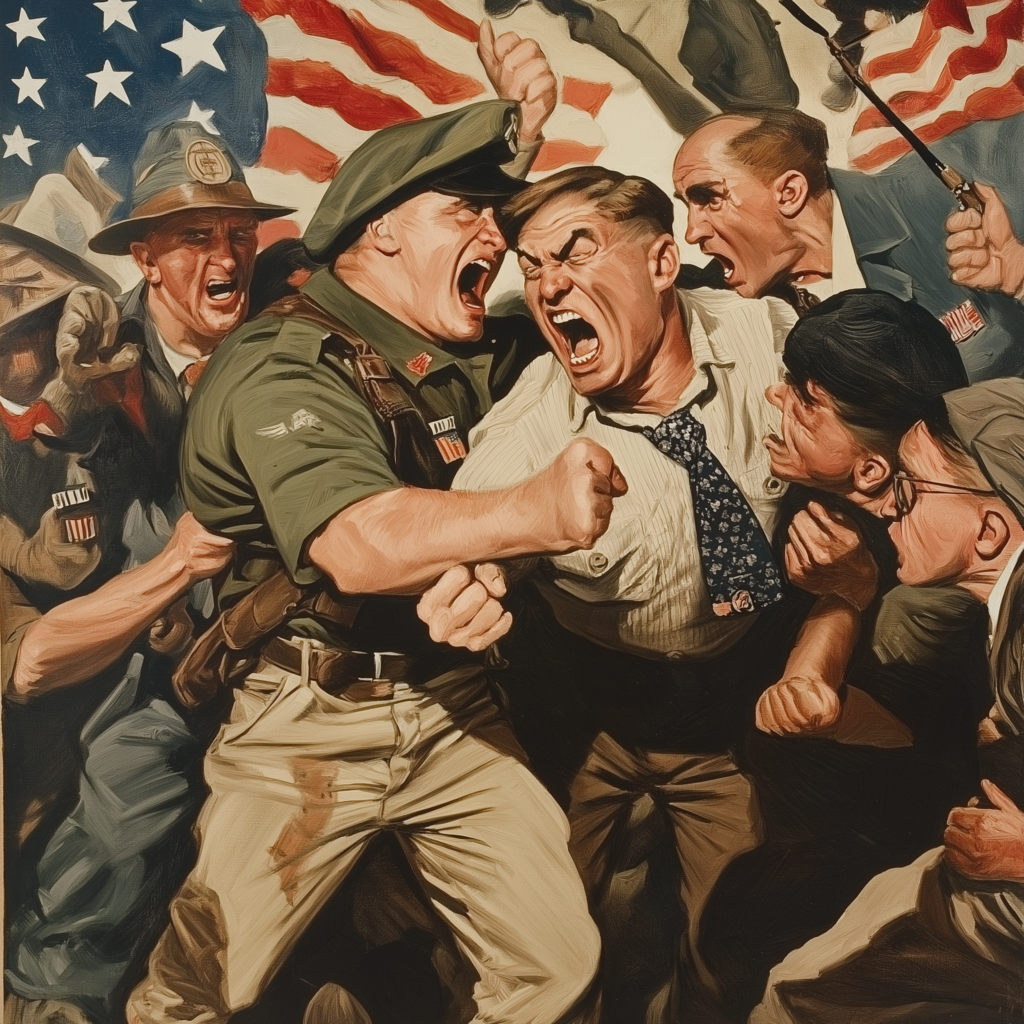Challenges, Resistance, and Survival
Throughout history, Freemasonry has survived and resisted oppressive regimes, most notably during the Nazi era, when it was targeted for its promotion of Enlightenment ideals such as individual liberty, fraternity, and intellectual freedom. The lessons from history provide critical insights into how Freemasonry might fare under a modern fascist government. Today’s global political climate has seen the rise of authoritarianism, nationalism, and the erosion of democratic institutions in many parts of the world, raising concerns about the future of Freemasonry if these trends intensify. This blog post explores how Freemasonry could survive under modern fascism, its potential challenges, and its broader implications for democracy and civil society.
The Ideological Clash Between Freemasonry and Fascism

Freemasonry’s long-standing commitment to liberal values, intellectual freedom, and tolerance places it at odds with the core tenets of fascism. Historically, fascist regimes—such as those in Nazi Germany and Mussolini’s Italy—have viewed Freemasonry with suspicion and hostility due to its perceived secrecy, international connections, and egalitarian values. These elements represent a direct challenge to the authoritarian, nationalist, and xenophobic ideologies that define fascist governance.
Modern fascist movements, which often emphasize nationalism, ethno-racial purity, and centralized control, would likely view Freemasonry as a subversive force. The fraternity’s inclusive membership policies, promotion of universal brotherhood, and support for democratic governance could make it a target of suppression. Fascist regimes, by their nature, seek to control civil society and eliminate any organization that promotes alternative worldviews or challenges the authority of the state. As such, Freemasonry’s values would likely be seen as incompatible with modern fascism, just as they were in the past.
Read: Freemasonry Under Nazi Fascism – Historical Context and the Roots of Persecution
Challenges Freemasonry Might Face Under a Modern Fascist Government
- Suppression of Civil Society: Fascist governments typically seek to control or dismantle independent civil society organizations, viewing them as potential threats to state authority. As an organization that promotes independent thought, tolerance, and intellectual inquiry, Freemasonry would likely be one of the first targets of suppression. We can draw historical parallels to Nazi Germany, where Freemasonry was banned in 1934, and Masonic lodges were either dissolved or confiscated by the state. A modern fascist regime could take similar measures to weaken Freemasonry’s influence (Lodge 46 Holocaust Encyclopedia). In many countries today, we have seen the erosion of civil liberties and the suppression of organizations that oppose authoritarianism. For instance, in places like Hungary and Poland, where populist governments have undermined democratic institutions and restricted civil society organizations, it is not hard to imagine that Freemasonry could come under similar pressure if the situation were to evolve into full-fledged fascism (Holocaust Memorial Day Trust). Freemasons could face restrictions on their ability to meet, communicate, or engage in public discourse, forcing the organization into hiding, much like it was during the Nazi era.
- Propaganda and Conspiracy Theories: Modern fascist regimes often rely heavily on propaganda to manipulate public opinion and vilify groups they see as threats. Freemasonry has long been a target of conspiracy theories, usually being falsely linked to globalist elites, secret world governments, and other shadowy influences. These conspiracy theories were prevalent in Nazi Germany and have been revived in various forms today, particularly in far-right circles that promote anti-Semitic, anti-globalist, and anti-Masonic rhetoric (Holocaust Encyclopedia Holocaust Memorial Day Trust). In a modern fascist state, state-controlled media would likely amplify these conspiracy theories as part of a broader propaganda campaign to justify repression. Freemasons could be falsely portrayed as enemies of the state, working in secret to undermine national sovereignty and promoting liberal democratic values that fascists deem incompatible with their vision of society. This would serve to rally public support for the persecution of Freemasons, much like Nazi propaganda did during World War II.
- Targeted Persecution and Legal Repression: One of the most direct forms of repression Freemasons might face under a modern fascist government is legal persecution. Freemasons could be banned from holding public office, working in government institutions, or engaging in certain professions, as was the case during the Nazi regime. Laws could be passed that criminalize Masonic membership, and the police or military could be used to crack down on Masonic gatherings and activities (Holocaust Memorial Day Trust). Furthermore, Freemasons could face physical violence, imprisonment, or worse, as fascist governments often use state security forces to suppress opposition. During the Nazi era, many Freemasons were arrested, tortured, and sent to concentration camps, where they were classified as political prisoners and forced to wear red triangles to mark their affiliation. In modern times, authoritarian governments have used similar tactics against dissidents, from forced disappearances to imprisonment, making such outcomes a genuine concern for Freemasonry under a fascist regime (Lodge 46 Holocaust Encyclopedia).
How Freemasonry Might Resist and Survive
While Freemasonry has historically been a target of authoritarian regimes, it has also demonstrated remarkable resilience. In the face of modern fascism, Freemasonry would likely adopt various strategies to resist repression and ensure its survival.
- Going Underground: Just as Freemasons formed clandestine lodges during the Nazi era, they would likely return to underground activities under a modern fascist regime. These secret gatherings would allow Freemasons to continue practicing their rituals, share information, and maintain solidarity in the face of state repression. The fraternity’s long history of operating in secrecy could prove invaluable in helping it evade state surveillance and avoid detection by fascist authorities (Lodge 46).
- International Solidarity: Freemasonry’s global network could provide critical support during persecution. Masonic organizations in democratic countries could offer aid, resources, and moral support to their brothers living under fascist regimes. This international solidarity would help sustain the organization and preserve its principles, even when faced with severe repression. Furthermore, international Masonic lodges could raise awareness about the plight of Freemasons living under authoritarian rule, advocating for human rights and democratic freedoms on the global stage (Holocaust Encyclopedia).
- Adapting to Digital Landscapes: In the modern era, digital technology offers new opportunities for Freemasonry to survive and resist oppression. Online communication platforms and encrypted messaging services could allow Freemasons to continue their activities in secret, coordinating efforts, sharing information, and supporting one another without being easily detected by state authorities. Social media and digital activism could also help Freemasonry raise awareness about its mission and the challenges it faces, reaching a broader audience than ever before (Holocaust Memorial Day Trust).

The Broader Implications for Civil Society and Democracy
The survival of Freemasonry under a modern fascist regime would have broader implications for civil society and democracy. As a long-standing proponent of Enlightenment values, Freemasonry represents a bulwark against authoritarianism, standing for individual rights, intellectual freedom, and social equality. If a modern fascist government successfully suppressed Freemasonry, it would signal a broader erosion of these fundamental values.
Read: Masonic History
Moreover, the persecution of Freemasonry would likely be part of a larger crackdown on civil society, targeting other organizations that promote human rights, democracy, and social justice. This would create a chilling effect on political dissent and weaken the ability of citizens to organize and resist authoritarian rule. In this sense, the fate of Freemasonry under modern fascism is intrinsically linked to the future of democratic institutions and civil liberties worldwide.
A Continuing Struggle for Freedom
Freemasonry has faced and survived many periods of intense persecution throughout its history, particularly under authoritarian and fascist regimes. As modern fascist movements rise in many parts of the world, Freemasonry may once again find itself in the crosshairs of authoritarian governments. While the challenges are significant—ranging from legal repression to targeted violence—Freemasonry’s history of resistance, adaptability, and international solidarity provides hope for its survival.
In the broader context, Freemasonry’s struggle against modern fascism reflects the ongoing fight for democracy, human rights, and civil liberties. Freemasonry’s survival would represent a victory for those who believe in the power of intellectual freedom and tolerance to overcome oppression. In this way, the lessons from Freemasonry’s past can serve as a guide for how it might endure the challenges of the future.
